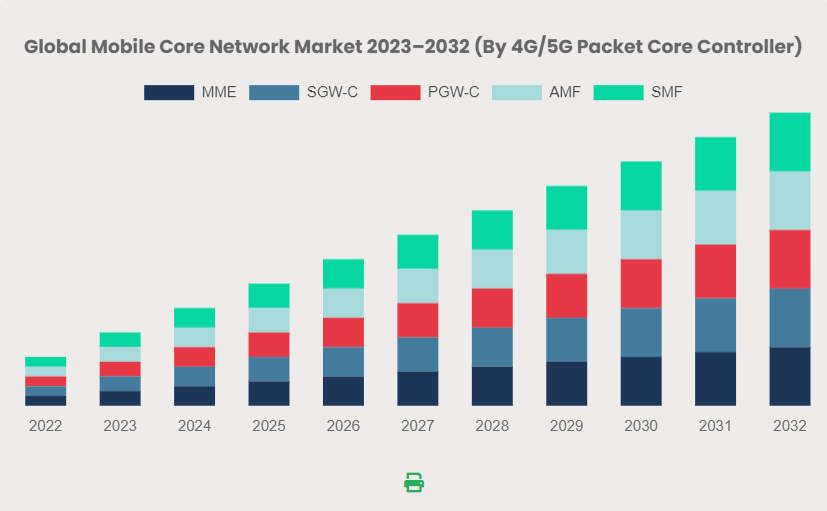The mobile core network market refers to the dynamic segment of the telecommunications industry responsible for managing and routing data and voice traffic within mobile networks. It comprises a complex ecosystem of hardware and software components that form the backbone of mobile communications.
The market's nature is highly technology-driven, characterized by rapid innovation, evolving standards, and intense competition among global players. Key trends include the rollout of 5G networks, network virtualization, edge computing integration, and a strong emphasis on security and sustainability as mobile networks continue to adapt to changing consumer demands and emerging technologies.
The Mobile Core Network Market presents significant growth opportunities due to several factors:
· 5G Expansion: The global rollout of 5G networks is a primary driver, demanding substantial investments in mobile core network infrastructure to support higher speeds, low latency, and massive IoT connectivity, revolutionizing industries.
· Rising Data Consumption: Escalating data consumption due to increased video streaming, IoT devices, and remote work is driving the need for more robust and efficient mobile core networks, adapting to evolving user demands.
· Network Virtualization: The adoption of network virtualization and cloud-native architectures is growing, enhancing scalability, flexibility, and cost-effectiveness while reducing operational costs and streamlining network management.
· Security Concerns: Heightened cybersecurity threats are pushing the demand for advanced security solutions within mobile core networks to safeguard against potential attacks, ensuring network integrity and user privacy.
· Edge Computing Integration: Integrating edge computing into mobile core networks presents an opportunity to reduce latency and support real-time applications, unlocking new use cases like autonomous vehicles, augmented reality, and smart cities.
· 5G-Enabled IoT: The proliferation of 5G-enabled IoT devices and applications offers a significant growth opportunity, as mobile core networks will be crucial in facilitating seamless connectivity and management of these devices, fueling the IoT revolution.
· Network Slicing Innovation: The development and deployment of network slicing technologies create opportunities for tailored network services. Operators can offer specialized slices for industries like healthcare, gaming, or logistics, optimizing network resources and revenue generation while meeting diverse customer needs.

(Source: www.custommarketinsight.com)
The Mobile Core Network Market faces several significant threats that could impact its growth and profitability in the future. Some of these threats include:
· Cybersecurity Vulnerabilities: With the increasing complexity of mobile core networks and the rise in cyber threats, there's a significant risk of security breaches, data theft, and network disruptions. Protecting against these vulnerabilities is a continuous challenge.
· Regulatory and Compliance Hurdles: Evolving regulations, such as data privacy laws and spectrum allocation, can pose challenges for mobile operators in terms of compliance, potentially impacting their operations and investments.
· Competitive Pressures: Intense competition among telecom equipment vendors and network providers can lead to price wars, affecting profitability and innovation within the market.
· Technological Obsolescence: Rapid technological advancements can render existing infrastructure and investments obsolete, requiring frequent upgrades and capital investments to stay competitive.
· Vendor Dependency: Reliance on a limited number of key equipment vendors can expose operators to supply chain risks, technological dependencies, and potential vendor-specific issues, impacting network stability and flexibility.
Source: https://www.custommarketinsights.com/report/mobile-core-network-market/

